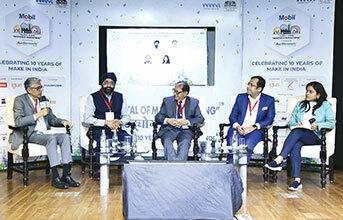
The Festival of Manufacturing witnessed a thought-provoking panel discussion centered on the theme of revolutionising the electric and electronic landscape in India, commemorating 10 years of the Make in India initiative.
Under the moderation of Nisha Shukla, Assistant Editor, B2B Division of Worldwide Media, The Times Group, industry stalwarts gathered to share insights on the journey and challenges of domestic electronic manufacturing. The panellists comprising Vivek Yadav, Executive Vice President, Havells India; HS Bhatia, MD, Kelwon Electronics and Appliances Private Limited; Sushil Virmani, Managing Director, Best Power Equipments; and Abhijit Vaish, Executive Director, Instapower Ltd, delved into the transformative impact of Make in India over the past decade on electric and electronic manufacturing, exploring challenges and achievements in the sector.
Abhijit Vaish, Executive Director of Instapower Ltd, initiated the dialogue by discussing the significant shift in the context of electronic manufacturing in India. He highlighted a substantial increase in domestic production capacities, partly attributed to robust government support measures for the manufacturing sector. Vaish emphasised the preferential treatment given to manufacturers with a substantial "Make in India" component, highlighting the correlation between the availability of credit finance and domestic production. "These initiatives," he said, "have not only led to job creation and skill development across sectors but have also driven innovation in domestic manufacturing." However, Vaish also highlighted persistent challenges such as "electricity shortages in factories," which continue to impede productivity. "Addressing this challenge is indeed the need of the hour," he added.
Sushil Virmani, Managing Director of Best Power Equipments (BPE), emphasised the significant role of technological advancements and government policies in stimulating the demand for electronics and consumer goods in India. He highlighted key initiatives such as the National Policy on Electronics (NPE) 2019, the implementation of GST, Digital India, and Smart Cities programs, among others, that have supported the growth of the electronics sector. Virmani emphasised that while India has made strides in achieving "local for vocal," the next step is towards "local for global." He urged the government to prioritise skill development initiatives and address infrastructure challenges to enable Indian electronic goods to compete on the global stage.
HS Bhatia, MD of Kelwon Electronics and Appliances Private Limited, recognised the positive impact of the government's Production Linked Incentive (PLI) scheme on domestic manufacturing. He also noted how this scheme, designed to provide financial incentives for domestic production, has significantly boosted the electronics sector.
Additionally, Bhatia commended other government initiatives such as the Prime Minister's commitment to 1 crore solar-powered houses, highlighting them as monumental steps forward. He proudly highlighted significant strides in electronics manufacturing, noting the transition from being a net importer to becoming an exporter, particularly in mobile phone manufacturing. He credited this remarkable growth to the reduction of entry barriers in manufacturing which has facilitated the entry of newcomers into the market.
Vivek Yadav, Executive Vice President, Havells India, discussed his organisation's strategic decision to substitute imports by setting up domestic manufacturing plants for parts that were once imported. He emphasised that such localisation is imperative for India's growth, citing how the biggest economies of the world invested in manufacturing early on.
Moreover, Yadav stressed the importance of innovation in areas like AI and IoT for manufacturing, highlighting the necessity for products to be IoT enabled, interconnected, and remotely accessible. He also spoke about the importance of enhancing labour quality and promoting gender diversity in manufacturing, citing Havells' ground-breaking step of creating a manufacturing facility with a 100 per cent women workforce.
The panel discussion concluded with a sense of optimism regarding the government's support and incentivisation, coupled with a mutual acknowledgment of the challenges that lie ahead. While India strives towards self-reliance and aims to become a net exporter in electronic manufacturing, the panellists reiterated the importance of addressing infrastructure challenges and fostering skill development to sustain the sector's growth.
In summary, the discussion concluded with a mutual consensus among the panellists on emphasising the need for collaboration between industry and government to maximise Make in India's next decade of electronic manufacturing.



























